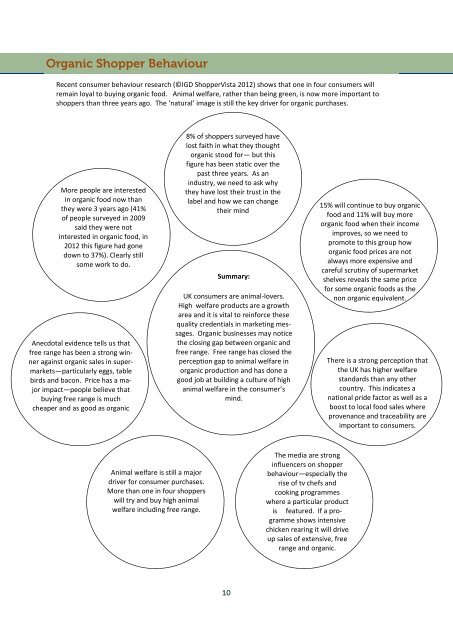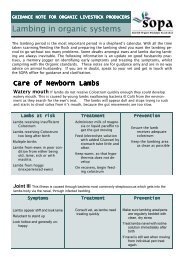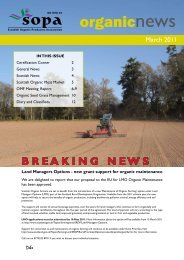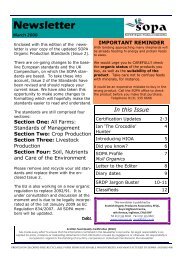organicNEWS - Scottish Organic Producers Association
organicNEWS - Scottish Organic Producers Association
organicNEWS - Scottish Organic Producers Association
Create successful ePaper yourself
Turn your PDF publications into a flip-book with our unique Google optimized e-Paper software.
<strong>Organic</strong> Shopper Behaviour<br />
Recent consumer behaviour research (©IGD ShopperVista 2012) shows that one in four consumers will<br />
remain loyal to buying organic food. Animal welfare, rather than being green, is now more important to<br />
shoppers than three years ago. The ‘natural’ image is still the key driver for organic purchases.<br />
More people are interested<br />
in organic food now than<br />
they were 3 years ago (41%<br />
of people surveyed in 2009<br />
said they were not<br />
interested in organic food, in<br />
2012 this figure had gone<br />
down to 37%). Clearly still<br />
some work to do.<br />
Anecdotal evidence tells us that<br />
free range has been a strong winner<br />
against organic sales in supermarkets—particularly<br />
eggs, table<br />
birds and bacon. Price has a major<br />
impact—people believe that<br />
buying free range is much<br />
cheaper and as good as organic<br />
8% of shoppers surveyed have<br />
lost faith in what they thought<br />
organic stood for— but this<br />
figure has been static over the<br />
past three years. As an<br />
industry, we need to ask why<br />
they have lost their trust in the<br />
label and how we can change<br />
their mind<br />
Summary:<br />
UK consumers are animal-lovers.<br />
High welfare products are a growth<br />
area and it is vital to reinforce these<br />
quality credentials in marketing messages.<br />
<strong>Organic</strong> businesses may notice<br />
the closing gap between organic and<br />
free range. Free range has closed the<br />
perception gap to animal welfare in<br />
organic production and has done a<br />
good job at building a culture of high<br />
animal welfare in the consumer’s<br />
mind.<br />
15% will continue to buy organic<br />
food and 11% will buy more<br />
organic food when their income<br />
improves, so we need to<br />
promote to this group how<br />
organic food prices are not<br />
always more expensive and<br />
careful scrutiny of supermarket<br />
shelves reveals the same price<br />
for some organic foods as the<br />
non organic equivalent.<br />
There is a strong perception that<br />
the UK has higher welfare<br />
standards than any other<br />
country. This indicates a<br />
national pride factor as well as a<br />
boost to local food sales where<br />
provenance and traceability are<br />
important to consumers.<br />
Animal welfare is still a major<br />
driver for consumer purchases.<br />
More than one in four shoppers<br />
will try and buy high animal<br />
welfare including free range.<br />
The media are strong<br />
influencers on shopper<br />
behaviour—especially the<br />
rise of tv chefs and<br />
cooking programmes<br />
where a particular product<br />
is featured. If a programme<br />
shows intensive<br />
chicken rearing it will drive<br />
up sales of extensive, free<br />
range and organic.<br />
10







